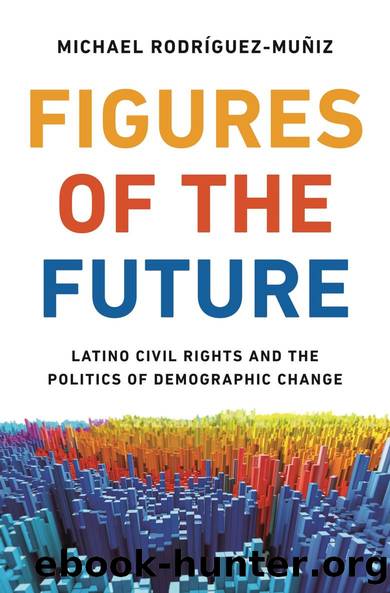Figures of the Future by Michael Rodriguez-Muñiz

Author:Michael Rodriguez-Muñiz [Rodriguez-Muñiz, Michael]
Language: eng
Format: epub
ISBN: 9780691199467
Barnesnoble:
Publisher: Princeton University Press
Published: 2021-07-06T00:00:00+00:00
FIGURE 5.2. LULAC Leadership on Capitol Hill, circa 2015. Used by permission of the League of United Latin American Citizens.
Demographic claims were not only directed at Republican officials. Later that afternoon we arrived at the office of a newly elected Democratic congressman from Texas. Sitting on brand-new leather chairs in a mostly undecorated office, we met with a legislative aide. Efrain de Leon, a LULAC staff member from the West Coast, asked me, as the resident researcher, to comment briefly on the âLatino vote,â its impact, and the importance of immigration reform. I obliged, sticking close to the talking points we had received in the training sessions. When I finished, Carlos Herrera, a longtime LULAC council member and leader from Texas, jumped in and stated that the bill needed to âmove away from punitiveâ measures. Another member called on the congressman to go as âfar to the left as possible.â The rationale: âso that we can meet somewhere in the middle.â Endorsing her colleagueâs point, another member reiterated the organizationâs opposition to more âcriminalization.â Carmen Vega, a New York member, stressed that LULAC did not want a path to citizenship that âdoesnât become a reality.â Dramatizing the long waits proposed by the Gang of Eight, she worried that many abuelas (grandmothers) would die without ever becoming U.S. citizens. Shifting from a moral to a political register, Carmen invoked a familiar figure: âItâs a numbers game ⦠fifty thousand Latinos turn eighteen every month! Weâll continue playing numbers and get the vote.â Despite this point, Efrain de Leon felt compelled to underscore after this visit that we could not forget to âremind them of our vote ⦠the power of our demographics.â
As members and affiliates communicated Latino âdemographic powerâ in legislative visits, so did the leaders and spokespersons. In February 2013 Janet MurguÃa testified before the U.S. Senate Judiciary Committee. Her prepared remarks touched on all of the major immigration policy positions of Latino advocacy groups. She challenged the need for additional enforcement, described the situation on the border as âalready intolerable,â and spoke about the contributions already being made by immigrants, including undocumented immigrants, to the country. âTheir lives are inextricably linked with ours,â she reiterated. MurguÃa characterized a path to citizenship as âthe single most essential element of immigration,â urging the path be made âclear,â âachievable,â and âdirectââall descriptors at odds with the punitive language coming out of the Senate and White House. Anything less, she warned, would not be âlegitimateâ to the Latino community.
All these points about the content of the proposed legislation came after MurguÃa had articulated the demographic stakes:
As the recent election clearly demonstrated, the issue of immigration is a galvanizing one for the nationâs Hispanic community. There is a precious opportunity to address it humanely and responsibly. The toxicity in this debate has affected us deeply, regardless of immigration status, and we see getting this debate on the right course as a matter of fundamental respect for the presence and role of Latinos in the U.
Download
This site does not store any files on its server. We only index and link to content provided by other sites. Please contact the content providers to delete copyright contents if any and email us, we'll remove relevant links or contents immediately.
Cecilia; Or, Memoirs of an Heiress — Volume 1 by Fanny Burney(32559)
The Great Music City by Andrea Baker(32020)
Cecilia; Or, Memoirs of an Heiress — Volume 2 by Fanny Burney(31957)
Cecilia; Or, Memoirs of an Heiress — Volume 3 by Fanny Burney(31943)
We're Going to Need More Wine by Gabrielle Union(19049)
All the Missing Girls by Megan Miranda(16033)
Pimp by Iceberg Slim(14513)
For the Love of Europe by Rick Steves(14138)
Bombshells: Glamour Girls of a Lifetime by Sullivan Steve(14077)
Talking to Strangers by Malcolm Gladwell(13374)
Norse Mythology by Gaiman Neil(13371)
Fifty Shades Freed by E L James(13244)
Mindhunter: Inside the FBI's Elite Serial Crime Unit by John E. Douglas & Mark Olshaker(9345)
Crazy Rich Asians by Kevin Kwan(9293)
The Lost Art of Listening by Michael P. Nichols(7507)
Enlightenment Now: The Case for Reason, Science, Humanism, and Progress by Steven Pinker(7315)
The Four Agreements by Don Miguel Ruiz(6766)
Bad Blood by John Carreyrou(6623)
Weapons of Math Destruction by Cathy O'Neil(6282)
